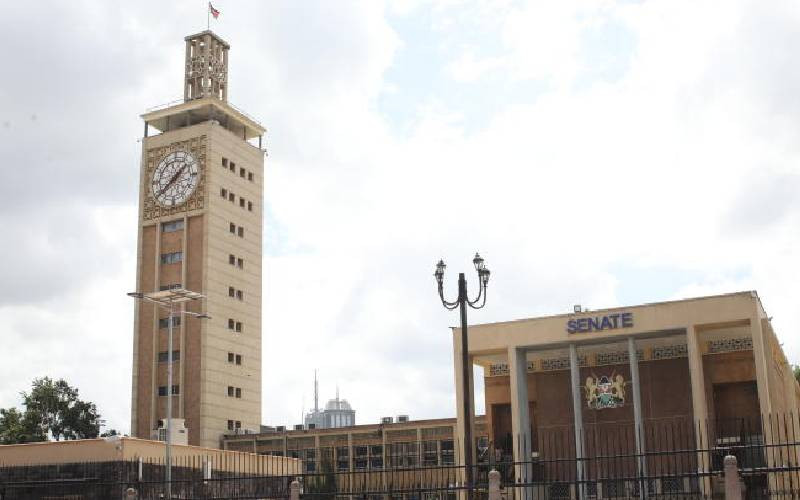
The battle of the control of billions of shillings going to education bursaries has taken a new dimension.
Senators are now seeking to bar governors from managing the kitty which they say is being run illegally.
In a report tabled before the Senate late last year, Senate County Public Investments and Special Funds Committee points out that funding for primary, secondary, tertiary and university education is not part of devolved functions for the counties.
The report brought to the House by Committee chairman Godfrey Osotsi recommends that governors ensure that all county-established bursary funds are abolished since the allocation amounted to diverting resources from their constitutionally devolved functions.
“Under the Fourth Schedule of the Constitution, county governments are responsible for pre primary education, polytechnics, home craft centres and childcare facilities while, the national government oversees universities, tertiary institutions, primary, secondary schools, special education, and research institutions,” reads part of the report.
The latest proposal will likely lead to a war of words between senators on one front, and governors and Members of County Assembly who have been issuing bursaries to the people they represent on the other.
The report comes up at a time Kiambu Senator Karungo Thangwa has already filed a motion that proposes that the Ministry of Education consolidate the funds distributed by various government entities and agencies, with the aim of directing these funds directly to schools as supplementary capitation to facilitate the achievement of free secondary education.
Thangwa seeks to have an audit of the funds allocated to bursaries by both the national and county governments and calculate the cost of education per learner and make this information public for primary, secondary, and tertiary institutions including a detailed breakdown of the annual financial requirements for each student across the country.
“In the Financial Year 2024/25, approximately Sh656 billion was allocated to the education sector, making it difficult to ascertain specific funds granted to each student. Lack of transparency in the disbursement of bursaries from various agencies makes it difficult to determine the total amount allocated in a financial year, hindering efforts to ensure equitable access to education for financially disadvantaged students,” said Thangwa.
In most counties, there are Governor bursaries managed by the executive and MCA bursaries. The Senate committee argues that, in most counties, there are cases of students getting multiple bursaries to the detriment of those who are needy.
The report points out that there are cases where students get bursaries from multiple wards within the same county while others receive bursaries from both the County Bursary Fund and other donors, limiting the equitable distribution of resources.
“There are cases of multiple bursaries across various counties where students received bursaries from various wards within the same county while certain students received bursaries from both counties and donors, denying some deserving students a chance to get support,” says the report.
The Senate committee observed that certain bursary fund regulations were made by County Executive Committee Members (CECM) under the national Public Finance Management (PFM) Act, Cap.412A. However, section 205(1) of the Act grants only the Cabinet Secretary responsible for Finance the authority to make regulations.
The senators pointed out that most county governments are operating multiple bursary funds and that there was need for CEC members responsible for matters relating to finance to ensure that the bursary funds operate under a centralized system across all wards to streamline the allocation.
Stay informed. Subscribe to our newsletter
The report noted that reliance on the national law to develop county-specific regulations highlights the inadequacy of the offices of the County Attorney in providing necessary legal and technical advice to their counties. It is calling on counties to ensure the capacity of all county attorneys is continuously enhanced.
The Kiambu senator wondered why the Ministry of Education, which is mandated to provide education to all, has a scholarship programme known as Elimu Kenya Scholarship Fund of up to Sh4 billion, which he termed as discrimination, saying that the consolidation of all the funds would lead to a kitty worth Sh122 billion.
Nominated Senator Raphael Chimera supported the Thangwa Motion urging all senators to support it. Chimera says Thangwa’s is an idea whose time has come.
Chimera said some senators had served as Members of the National Assembly and had a chance to interact, run, programme and channel bursary funds. He noted that, today, Women Representatives have funds under National Government Affirmative Action Fund to which he is proud to have served as the pioneer fund manager.
“Our colleagues in the National Assembly are running the NG-CDF, governors have various scholarships in their own ways and rights. We are just asking ourselves how sustainable this programme is,” said Chimera.
Narok Senator Ledama ole Kina said bursaries are very important, but MPs, Women Reps, mandarins in the Ministry of Education and the Office of the President will not want to let go that opening to dish out goodies to their children, friends and constituents.